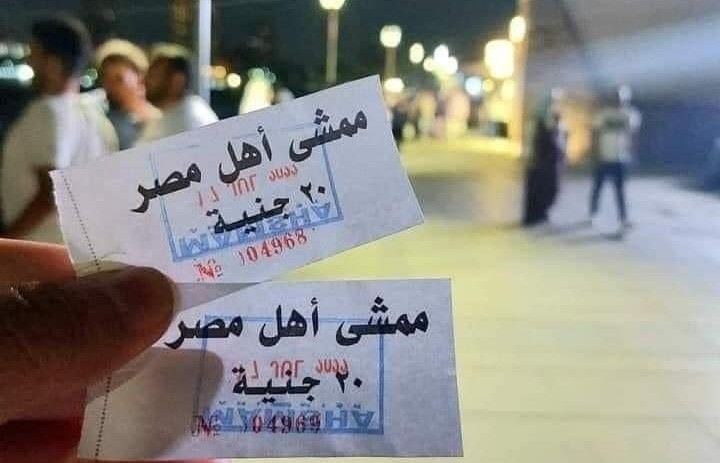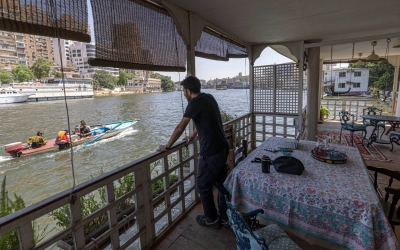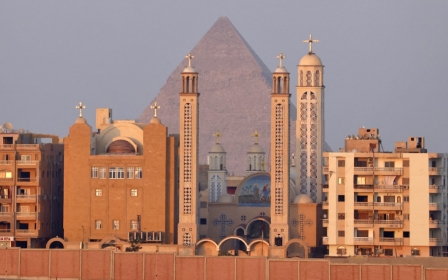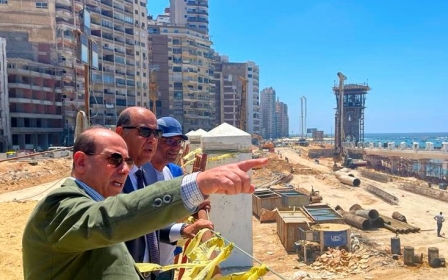Egyptians to be charged prohibitive entry fee to Nile's corniche walkway

An Egyptian human rights lawyer filed a lawsuit this week against a recently imposed entry fee for a new walkway project on the Nile river corniche in the capital Cairo, arguing it violates people's right to access the river.
Ahl Masr Walkway was opened to the public in March when Egypt's Prime Minister Mustafa Madbouly said it would be free of charge to use as its goal was "to improve the quality of life of Egyptian citizens".
However, Egyptians were shocked by the introduction of a 20 Egyptian pounds ($1.05) entry fee to the walkway following the end of the Eid al-Adha holiday last week.
'The people of Egypt cannot afford to pay twenty pounds for this. They can barely afford to live on this amount every day'
- Gamal Sultan, journalist
Khaled Ali, an Egyptian human rights lawyer, filed the court case to scrap the entry fee, saying that the name of the project, which can be translated as the "People of Egypt's Walkway," means that the project belongs to Egyptian citizens from all walks of life, whom the Egyptian constitution of 2014 granted the right of access to the Nile river.
Some MPs have criticised the new measure saying that a family of five would pay a considerable sum of 100 Egyptian pounds ($5.28) entry fee.
New MEE newsletter: Jerusalem Dispatch
Sign up to get the latest insights and analysis on Israel-Palestine, alongside Turkey Unpacked and other MEE newsletters
A third of Egypt's 102.3m population lives below the poverty line and survives on less than $1.45 a day while facing a rising cost of living, according to data from the World Bank.
'Scrap the fee'
Ali said that the project was built with taxpayers' money, and authorities should charge an extra fee from entrepreneurs who have restaurants, houseboat cafes, theatres, and yacht owners, to cover the maintenance and development costs.
Ahl Masr Walkway is a gigantic project on the Nile river corniche, which has cost $30m in the first phase of development.
It stretches almost 4.7km long and includes 19 buildings for shopping stores and restaurants, three parking lots with a total capacity of 180 cars, three auditoriums accommodating 1,240 people, and a theatre with 772 seats.
It has a ground-level walkway with a width of 4.5 meters, which is planted with 260 palm and 235 other trees and an underground walkway.
Amr Khattab, an engineer, and spokesperson for Egypt's Ministry of Housing, told local media that the 20 pounds fee is only for entry to the underground level, "to prevent vandalism," while the ground level is free of charge.
Khattab added that the fee covers the parking and services costs of the underground level.
On Wednesday, Mohamed Saad El-Samoudi, an Egyptian MP, submitted a request to Madbouly and Assem El-Gazza, the minister of housing, utilities, and urban communities, asking them to cancel the newly imposed entry fee.
Egyptians have shared several pictures of the 20 pounds entry fee note on social media, with one tweeting that "this is no longer the walkway of the Egyptian people".
"They took over the Nile shore in Cairo, and deprived the simple people of it, and told them, 'we will build the Walkway of the People of Egypt'.
Then when they accomplished it, the poor people thought that it really belonged to the people of Egypt," Gamal Sultan, an opposition journalist, wrote. "They did not imagine the name was only a slogan."
Another opposition activist, Amr Abdelhady, said the promenade should now be called "the walkway of the people of Sisi" rather than the people of Egypt.
"The people of Egypt cannot afford to pay twenty pounds for this. They can barely afford to live on this amount every day," he wrote on Twitter.
Middle East Eye delivers independent and unrivalled coverage and analysis of the Middle East, North Africa and beyond. To learn more about republishing this content and the associated fees, please fill out this form. More about MEE can be found here.





